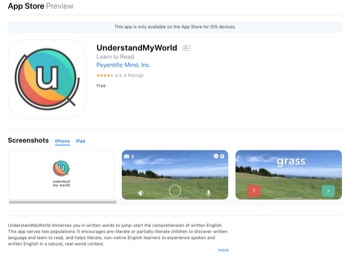Campus News
Massaro introduces app to boost literacy
Dominic Massaro, a professor emeritus of psychology, has developed a new iPhone app designed to help children learn to read.

Dominic Massaro, a professor emeritus of psychology, has developed a new iPhone app designed to help children learn to read. The app, which also helps people learning English as a second language, allows users to experience spoken and written English in a natural, real-world context.
The app, “Understand My World,” immerses users in written words, which jump starts their comprehension, said Massaro.
“The app encourages pre-literate and partially literate children to discover written language and learn to read,” said Massaro, whose research focused on how people understand language.
As a cognitive psychologist, Massaro discovered parallels between understanding speech and reading. He developed a fuzzy logical model of perception that was capable of quantitatively describing how people perceive spoken language and how they read.
However, Massaro was puzzled by the different ways children learn these two modalities: Children learn spoken language from birth but typically don’t learn how to read until they go to school, or have direct instruction. The proven strategy for teaching reading involves phonics, in which children learn the sounds that letters make and how these sounds are blended together in order to access written words.
Massaro reasoned that if children were exposed to as much written language as spoken language, they would learn to read naturally—or at least learn the mechanics of reading without direct instruction.
The new app provides the “immersive” environment Massaro sought, as the phone’s camera and microphone help users understand spoken words and see written language.
“The app is designed to be intuitive and seamless to use,” said Massaro. “Images captured by the camera are labeled and defined in both speech and writing. Participants speak into their device to record their speech or ask questions, then the app presents the dictated words or answers in both spoken and written form.”
The rate of speech and size of the letters are easily adjusted to accommodate all different learners, and the microphone allows user to ask a variety of open-ended questions, such as “Tell me about…” or “Define…” and “What is…?”. A required internet connection preserves the participants’ anonymity, and indecent or offensive words are not acknowledged in dictation or used in responses, noted Massaro.